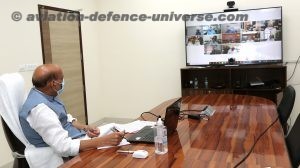- Asks them to aid civilian administration to tide over the current situation; gives go ahead for emergency procurement of critical medical supplies

New Delhi. 22 April 2021. Defence Minister of India Rajnath Singh held a virtual meeting to review the preparedness of Ministry of Defence and Armed Forces to deal with the recent spike in COVID-19 cases across the country.
Defence Secretary Dr Ajay Kumar, Chief of Defence Staff General Bipin Rawat, Chief of Naval Staff Admiral Karambir Singh, Chief of Army Staff General M M Naravane, Director General Armed Forces Medical Services (AFMS) Surg Vice Admiral Rajat Datta, Secretary (Defence Production) Raj Kumar, Secretary Department of Defence R&D and Chairman Defence Research and Development Organisation Dr G Satheesh Reddy, Financial Adviser (Defence Services) Sanjiv Mittal and other senior civil & military officers attended the meeting via video conferencing.
Rajnath Singh was briefed about the measures taken by AFMS, DRDO, Defence Public Sector Undertakings (DPSUs), Ordnance Factory Board (OFB) and other organisations of Ministry of Defence such as National Cadet Corps (NCC) in providing aid to the civil administration in this hour of crisis. The Minister was informed that a COVID care centre established by Hindustan Aeronautics Limited (HAL) is active in Bengaluru assisting the civil administration. He was informed that arrangements are being made by the DPSUs to buy oxygen plants that will help them in production of oxygen cylinders at a faster pace. He asked the DPSUs, OFB and DRDO to work on war footing to provide oxygen cylinders and extra beds to civil administration/state governments at the earliest.
Rajnath Singh called upon the Armed Forces to be in close contact with the state governments and be ready to provide any required assistance. In a significant decision, the Minister directed the Armed Forces and other stakeholders to go ahead with procurement of critical medical requirements under emergency powers of procurement.
DRDO Chairman briefed that a COVID-19 facility, developed by DRDO, has again been made functional in New Delhi and efforts are being made to soon increase the number of beds from 250 to 500. Dr Sathish Reddy informed the meeting that the ESIC Hospital, which was converted to COVID hospital in Patna, has started functioning with 500 beds and a COVID hospital will soon be made functional at Muzaffarpur in Bihar. He also informed that work is on war footing to set up a 450-bed hospital in Lucknow, 750-bed hospital in Varanasi, Uttar Pradesh and 900-bed hospital in Ahmedabad, Gujarat.
Rajnath Singh was also informed that based on the On-Board Oxygen Generation Technology developed for LCA Tejas, a 1000 litre/minute capacity oxygen generation plants technology has been given to the industry and the Uttar Pradesh government has placed order of five such plants with the industry. Dr Reddy informed the Raksha Mantri that more plants can be supplied by the industry to cater to the hospital requirements. He further said SpO2 (Blood Oxygen Saturation) based supplemental oxygen delivery system developed for soldiers posted at extreme high-altitude areas can be used for COVID patients as their conditions become similar. The product will be available soon in the market from the industry as per technology provided by DRDO.
The Minister was informed that the AFMS has mobilised its man power and other resources in various military hospitals dealing with COVID patients. To augment the manpower if required, Raksha Mantri suggested to utilise the services of vaccinated retired Armed Forces personnel to assist the civil administration/state governments to deal with the current situation.
During the meeting, Rajnath Singh also discussed ways to contain the spread of COVID-19 among the Armed Forces personnel and the officers/staff working in Ministry of Defence. He focused on COVID appropriate behavior at the work place, stressing on the need to strictly follow all the COVID protocols such as wearing of masks at all times and maintaining physical distancing.




























































































































